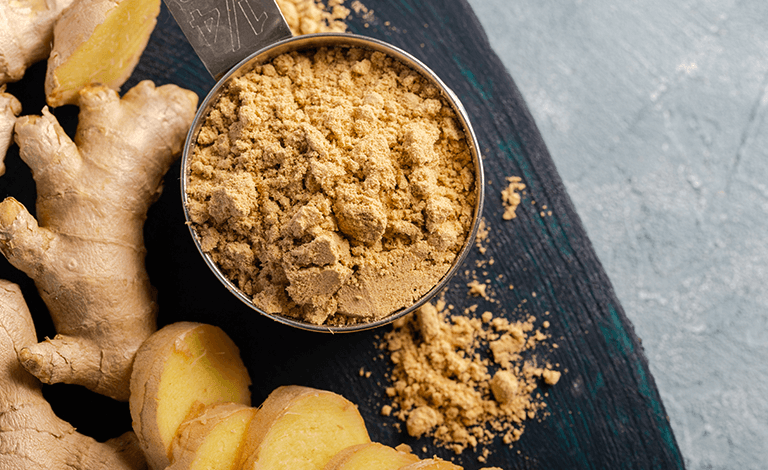POWERFUL BENEFITS OF GINGER

What is ginger tea? Ginger tea is a beverage made by infusing the root of the ginger plant in hot water. Ginger is a flowering plant that originates from China and has been used for centuries in traditional medicine and culinary practices. benefits of ginger
benefits of ginger, To make ginger tea, dried or fresh ginger is steeped in hot water for a few minutes, allowing the aromatic oils and compounds within the ginger root to infuse into the water. The resulting tea has a distinctively warm, slightly spicy, and slightly sweet flavor profile. Ginger tea can be made at home by grating or thinly slicing fresh ginger into a mug or teapot and pouring hot water over it. Alternatively, it can be purchased as dried, loose ginger pieces or packaged in tea bags for convenient brewing.

What is the history of ginger tea? Ginger tea has a long and storied history, tracing its origins back thousands of years to ancient China. In Traditional Chinese Medicine, ginger has long been revered for its medicinal properties and was commonly used as a health tonic and remedy. The use of ginger in tea form dates back at least 5,000 years in China, where it was steeped in hot water and consumed for its purported health benefits. benefits of ginger
Ginger was later introduced to Europe much later, during the spice trade era, where it was initially valued more as a culinary spice than a medicinal herb. However, the therapeutic uses of ginger, including in tea form, eventually made their way to the West as well. Today, ginger tea is enjoyed worldwide both for its pleasing flavor and its potential health benefits. benefits of ginger, Health benefits of ginger tea. May help to ease digestive discomfort Ginger tea is perhaps best known for its potential ability to soothe digestive issues.
The active compounds in ginger, such as gingerol, are believed to have anti-inflammatory and antispasmodic effects that can help calm an upset stomach, relieve nausea, and ease other gastrointestinal distress. In fact, some research suggests ginger may be just as effective as certain medications in relieving morning sickness, but without the potential side effects. May have anti-inflammatory properties In addition to its digestive benefits, ginger is also prized for its purported anti-inflammatory effects. benefits of ginger
Table of Contents
The bioactive compounds in ginger have been shown to help reduce inflammation in the body, which may make ginger tea helpful for managing conditions characterized by chronic inflammation, such as arthritis. Regularly consuming ginger tea may help lower inflammation and related pain. May boost immunity Ginger is also rich in antioxidants and has antimicrobial properties, which suggest it may help support a healthy immune system.
benefits of ginger, Some research indicates that the compounds in ginger may enhance the function of the immune system and help the body better fight off infections and illnesses. Drinking ginger tea may therefore be a beneficial way to give the immune system a boost. May improve circulation The warming properties of ginger are believed to have positive effects on blood circulation. Ginger tea may help improve blood flow and promote healthy circulation throughout the body.

This could potentially provide benefits for cardiovascular health and may even help relieve symptoms of conditions like Raynaud’s phenomenon. Overall, ginger tea is a versatile and flavorful beverage with a long history of traditional use and a growing body of research supporting its potential health benefits. From soothing the stomach to fighting inflammation, ginger tea offers a natural and delicious way to support overall well-being. Support a healthy microbiome.
May help to reduce blood pressure A 2017 study found that those who consume ginger on a daily basis had a decreased risk of hypertension. benefits of ginger, While the study didn’t look specifically at ginger tea, it may be useful to consume ginger tea if you have high blood pressure. May aid weight loss There have been a few studies into the benefits of ginger when it comes to weight and obesity.
A review of this research highlighted that ginger may have a positive impact on obesity through a number of different mechanisms, including appetite control and increasing thermogenesis (heat production). Again, this research is not specific to ginger tea, but it may be beneficial to include ginger tea as part of a balanced diet. Ease headaches and migraines There’s been a fair amount of research into ginger and its pain-relieving properties, including its potential benefit for those who struggle with headaches and migraines.
Drinking ginger tea, therefore, may also help both prevent and relieve headaches. Support a Healthy benefits of ginger, Microbiome The microbiome, or the community of microorganisms that live in our gut, plays a crucial role in maintaining overall health. Ginger is known to be a prebiotic, which means it helps to feed and nourish the beneficial bacteria in the gut.
benefits of ginger, Consuming ginger tea can help to support a diverse and thriving microbiome, which in turn can boost the immune system, aid digestion, and even influence mental health. May Help to Reduce Blood Pressure High blood pressure, or hypertension, is a significant risk factor for heart disease and stroke. A 2017 study found that individuals who consumed ginger on a daily basis had a decreased risk of developing hypertension.
benefits of ginger, While this study did not specifically examine the effects of ginger tea, it is reasonable to assume that the active compounds in ginger, such as gingerol and shogaol, may help to relax blood vessels and lower blood pressure when consumed in the form of ginger tea. May Aid in Weight Loss Maintaining a healthy weight is essential for overall well-being, and ginger has been studied for its potential to support weight management.
Research has shown that ginger may have a positive impact on obesity through various mechanisms, including appetite control and increased thermogenesis, or the body’s ability to produce heat. While these studies did not focus on ginger tea specifically, incorporating this soothing and aromatic beverage into a balanced diet may provide additional support for weight loss efforts. Ease Headaches and Migraines Ginger has long been recognized for its pain-relieving properties, and research has indicated that it may be beneficial for individuals who struggle with headaches and migraines.
The anti-inflammatory and analgesic (pain-relieving) effects of ginger are thought to be the primary reasons for its potential in alleviating these types of headaches. Drinking ginger tea may, therefore, offer a natural and effective way to both prevent and relieve the discomfort associated with headaches and migraines.
benefits of ginger, Overall, the versatile and flavorful ginger tea can provide a range of health benefits, from supporting a healthy gut to potentially aiding in the management of high blood pressure, weight, and headaches. Incorporating this herbal tea into your daily routine can be a simple and enjoyable way to support your overall well-being.
Fights fungal infections Fungal infections cause a wide variety of conditions, from yeast infections to jock itch and athlete’s foot. Fortunately, ginger helps kill off disease-causing fungi due to its powerful antifungal properties. A 2016 test-tube study found ginger extract to be effective against two types of yeast that commonly cause fungal infections in the mouth.
benefits of ginger, Another test-tube study measured the antifungal effects of 29 plant species and found that ginger was among the most effective at killing off fungus. May protect against stomach ulcers Several animal studies have found that ginger benefits may include helping prevent the formation of stomach ulcers, which are painful sores that form in the lining of the stomach and cause symptoms like indigestion, fatigue, heartburn and abdominal discomfort.
In fact, one 2011 animal study showed that ginger powder protected against aspirin-induced ulcers by decreasing levels of inflammatory proteins and blocking the activity of enzymes related to ulcer development. Elaborated passage: Fights Fungal Infections Fungal infections are a common and widespread problem, causing a variety of unpleasant and often persistent conditions. From the itchy and uncomfortable yeast infections that can affect both men and women, to the unsightly and stubborn athlete’s foot and jock itch, these fungal invaders can be a real nuisance.
Fortunately, nature has provided us with a powerful ally in the form of ginger, a versatile spice with remarkable antifungal properties. Recent scientific studies have shed light on ginger’s remarkable ability to combat disease-causing fungi. A 2016 test-tube study, conducted by a team of researchers, found that ginger extract was highly effective against two common types of yeast that are known to cause fungal infections in the mouth.
Delving deeper, another test-tube study examined the antifungal effects of a staggering 29 different plant species, and the results were clear – ginger stood out as one of the most potent and effective at killing off fungal growth. benefits of ginger, May Protect Against Stomach Ulcers In addition to its impressive antifungal capabilities, ginger has also been the subject of numerous animal studies investigating its potential benefits for digestive health.
Several of these studies have found that ginger may play a role in helping to prevent the formation of painful stomach ulcers, which are sores that develop in the lining of the stomach and can cause a range of unpleasant symptoms, including indigestion, fatigue, heartburn, and abdominal discomfort. One particularly compelling 2011 animal study showed that ginger powder was able to protect against ulcers caused by aspirin use.

benefits of ginger, The researchers discovered that ginger worked its magic by decreasing the levels of inflammatory proteins and blocking the activity of enzymes that are known to contribute to the development of ulcers. This promising finding suggests that ginger could potentially be a natural and effective way to help safeguard digestive health and prevent the formation of troublesome stomach ulcers.





